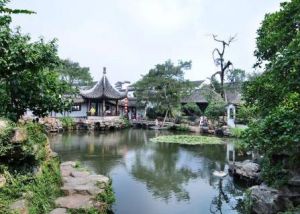Difference between revisions of "Wangshi Garden"
imported>Superleila (Created page with ''''Wangshi (Master of the Nets) Garden''' is a key cultural relic site under state protection, occupying 0.53 hectares on Shiquan Street in Suzhou. Its predecessor was the W...') |
imported>Ciic |
||
| Line 1: | Line 1: | ||
| − | '''Wangshi (Master of the Nets) Garden''' is a key cultural relic site under state protection, occupying 0.53 hectares on Shiquan Street in [[Suzhou]]. Its predecessor was the Wanjuan (Ten-Thousand Volumes) Hall, alias Yuying (Fisherman's Retreat), owned by [[Shi Zhengzhi]], a book collector of the [[Southern Song Dynasty]] (1127-1279). During [[Emperor Qianlong]]'s reign of the [[Qing Dynasty]] (1644-1911), the retired official [[Song Zongyuan]] bought the garden and named it the Wangshi (Master of the Nets) Garden. | + | [[File:Wangshi Garden, Suzhou, Jiangsu.jpg|thumb|Wangshi Garden, Suzhou, Jiangsu]] |
| + | '''Wangshi (Master of the Nets) Garden''' ('''网师园''') is a key cultural relic site under state protection, occupying 0.53 hectares on Shiquan Street in [[Suzhou]]. Its predecessor was the Wanjuan (Ten-Thousand Volumes) Hall, alias Yuying (Fisherman's Retreat), owned by [[Shi Zhengzhi]], a book collector of the [[Southern Song Dynasty]] (1127-1279). During [[Emperor Qianlong]]'s reign of the [[Qing Dynasty]] (1644-1911), the retired official [[Song Zongyuan]] bought the garden and named it the Wangshi (Master of the Nets) Garden. | ||
The most striking features of the garden are: all its pavilions are surrounded by water; and small as its size is, the scale of its buildings is large, yet nothing appears cramped. | The most striking features of the garden are: all its pavilions are surrounded by water; and small as its size is, the scale of its buildings is large, yet nothing appears cramped. | ||
Now, Wangshi Garden is unique for its night life, when performances of Kunqu operas, Pingtan ballad-singing, Jiangnan music and other folk arts are staged in its illuminated halls and pavilions. | Now, Wangshi Garden is unique for its night life, when performances of Kunqu operas, Pingtan ballad-singing, Jiangnan music and other folk arts are staged in its illuminated halls and pavilions. | ||
| − | |||
[[category:tourism]] | [[category:tourism]] | ||
Latest revision as of 09:56, 29 May 2015
Wangshi (Master of the Nets) Garden (网师园) is a key cultural relic site under state protection, occupying 0.53 hectares on Shiquan Street in Suzhou. Its predecessor was the Wanjuan (Ten-Thousand Volumes) Hall, alias Yuying (Fisherman's Retreat), owned by Shi Zhengzhi, a book collector of the Southern Song Dynasty (1127-1279). During Emperor Qianlong's reign of the Qing Dynasty (1644-1911), the retired official Song Zongyuan bought the garden and named it the Wangshi (Master of the Nets) Garden.
The most striking features of the garden are: all its pavilions are surrounded by water; and small as its size is, the scale of its buildings is large, yet nothing appears cramped.
Now, Wangshi Garden is unique for its night life, when performances of Kunqu operas, Pingtan ballad-singing, Jiangnan music and other folk arts are staged in its illuminated halls and pavilions.
